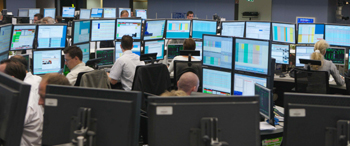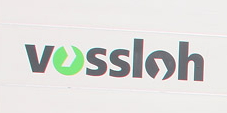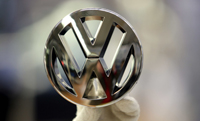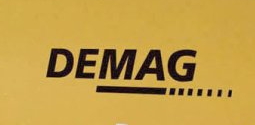VIPsight - August 2011
COMPANIES
Shareholders approve stock-exchange merger
 After NYSE Euronext shareholders gave the merger into the largest stock-market operator worldwide their imprimatur in early July, with an approval rate of 96 per cent, a week later more than 80 percent of Deutsche Börse’s shareholders exchanged their shares for the securities of Alpha Beta Netherland Holding, set up specially for the merger. Thus all of the conditions for the merger on the shareholder side are in place. The Deutsche Börse share was replaced in the Dax on 20 July by the new Alpha Beta Holding one, with a new security code number but still under the Deutsche Börse name. Since not all Deutsche Börse shares were exchanged, the number of units is reduced. At the same time the free-float rate was lowered to 77.83 percent. Deutsche Börse shareholders will hold 60 percent of the new company after the completion of the action. While NYSE CEO Duncan Niederauer will head the company’s business, Deutsche-Börse chief Reto Francioni will chair the supervisory board. The deal has a value of 6.52 billion euros. However, various authorities still have to approve the merger. This may take until 2012. The EU Commission is to indicate by 4 August whether not they accept the deal.
After NYSE Euronext shareholders gave the merger into the largest stock-market operator worldwide their imprimatur in early July, with an approval rate of 96 per cent, a week later more than 80 percent of Deutsche Börse’s shareholders exchanged their shares for the securities of Alpha Beta Netherland Holding, set up specially for the merger. Thus all of the conditions for the merger on the shareholder side are in place. The Deutsche Börse share was replaced in the Dax on 20 July by the new Alpha Beta Holding one, with a new security code number but still under the Deutsche Börse name. Since not all Deutsche Börse shares were exchanged, the number of units is reduced. At the same time the free-float rate was lowered to 77.83 percent. Deutsche Börse shareholders will hold 60 percent of the new company after the completion of the action. While NYSE CEO Duncan Niederauer will head the company’s business, Deutsche-Börse chief Reto Francioni will chair the supervisory board. The deal has a value of 6.52 billion euros. However, various authorities still have to approve the merger. This may take until 2012. The EU Commission is to indicate by 4 August whether not they accept the deal.
Vossloh has new major shareholder
 He sees his investment as long-term and strategic, said Heinz Hermann Thiele at the end of July. But he would not influence the composition of the supervisory board or management or change the dividend policy, the billionaire, who already owns brake manufacturer Knorr-Bremse, stated. Thiele had expanded his commitment to the Vossloh rail technology group in spring to over five percent, and announced plans to expand his share further. In July Thiele took advantage of a Vossloh stock price slippage: the company was forced by delayed operations in China and Russia to reduce its forecasts for 2011. By the end of July Thiele finally held 15.29 percent and was catching up on the Vossloh family, with its 31 percent stake in the Sauerland company. Observers now speculate as to whether Thiele might be planning a merger of Vossloh with Knorr-Bremse, since both companies are engaged in the railroad business. However, there are no real overlaps.
He sees his investment as long-term and strategic, said Heinz Hermann Thiele at the end of July. But he would not influence the composition of the supervisory board or management or change the dividend policy, the billionaire, who already owns brake manufacturer Knorr-Bremse, stated. Thiele had expanded his commitment to the Vossloh rail technology group in spring to over five percent, and announced plans to expand his share further. In July Thiele took advantage of a Vossloh stock price slippage: the company was forced by delayed operations in China and Russia to reduce its forecasts for 2011. By the end of July Thiele finally held 15.29 percent and was catching up on the Vossloh family, with its 31 percent stake in the Sauerland company. Observers now speculate as to whether Thiele might be planning a merger of Vossloh with Knorr-Bremse, since both companies are engaged in the railroad business. However, there are no real overlaps.
VW has majority at MAN
 Even at the end of June EU antitrust prevented VW from putting three of its own candidates on truckmaker MAN’s supervisory board before acquiring a majority stake under company law. The sticking point here was that Martin Winterkorn, Hans Dieter Poetsch and Jochem Heizmann already oversee VW subsidiary Scania. After the Wolfsburgers in May passed the 30 percent limit at the Munich DAX company, a public offer followed. VW offered MAN shareholders €95 per ordinary share and €59.90 per preference share. When the MAN price temporarily fell below the offer price, acceptance soared. 35.8 million common and 0.16 million preferred shares changed hands. With 55.9 percent, the actual goal of a 35 to 40 percent holding was far exceeded, and VW had to dig into its pockets for an extra €3.4 billion. With the majority that VW now holds in MAN, the Munich firm will now be integrated into the VW group and there merged with Scandinavian truck subsidiary Scania in one holding company. VW expects synergies of up to €200 million from common purchasing alone, as well as putting a spoke in the wheel of the German market leader in the truck business, Daimler. Analysts expect that VW could expand its share of MAN to 75 to 100 percent in the medium term. A separate stock-exchange listing for MAN in the Dax is thus coming to an end. The VW-MAN alliance is currently still subject to regulatory approval.
Even at the end of June EU antitrust prevented VW from putting three of its own candidates on truckmaker MAN’s supervisory board before acquiring a majority stake under company law. The sticking point here was that Martin Winterkorn, Hans Dieter Poetsch and Jochem Heizmann already oversee VW subsidiary Scania. After the Wolfsburgers in May passed the 30 percent limit at the Munich DAX company, a public offer followed. VW offered MAN shareholders €95 per ordinary share and €59.90 per preference share. When the MAN price temporarily fell below the offer price, acceptance soared. 35.8 million common and 0.16 million preferred shares changed hands. With 55.9 percent, the actual goal of a 35 to 40 percent holding was far exceeded, and VW had to dig into its pockets for an extra €3.4 billion. With the majority that VW now holds in MAN, the Munich firm will now be integrated into the VW group and there merged with Scandinavian truck subsidiary Scania in one holding company. VW expects synergies of up to €200 million from common purchasing alone, as well as putting a spoke in the wheel of the German market leader in the truck business, Daimler. Analysts expect that VW could expand its share of MAN to 75 to 100 percent in the medium term. A separate stock-exchange listing for MAN in the Dax is thus coming to an end. The VW-MAN alliance is currently still subject to regulatory approval.
VW consolidates Suzuki
What is a technical balance-sheet need for the Wolfsburgers is a broken agreement for Japanese carmaker Suzuki. The background to the latest “cultural misunderstanding” - as VW puts it - was that the involvement in Suzuki had been consolidated in VW’s annual report. Suzuki would therefore, contrary to agreement, be considered as part of the Volkswagen Group, on which Volkswagen could exert financial and operational impact, complained Suzuki. In 2009, Volkswagen acquired a 19.9 percent or €1.7 billion share in the fourth-largest Japanese automaker. As part of a cross-ownership, Suzuki bought an €850 million stake in the largest European manufacturer. While Wolfsburg hopes through Suzuki to gain entry into the small-car segment and the lucrative Indian market, the Japanese are looking to the collaboration for access to engine technologies. Suzuki now wants the criss-cross holdings put back to zero.
Major shareholder sells K+S shares
 Andrei Melnichenko has reduced his involvement in K+S to 9.88 percent, to raise funds for the development of his own potash production. In September 2010, the share of the Russian multi-billionaire, who runs his participation in the Kassel DAX Group through Meritus Trust, stood at 14.9 percent. Shortly thereafter in October 2010, talks on the joint development of a potash project in the Urals region of Perm were terminated unilaterally by EuroChem. The Russian producer of nitrogen and phosphate fertilizers also belongs, among others, to the anchor shareholder’s empire. To develop the deposit alone, the Russians now need the money from the sale of the K+S shares. It was only in March that the former parent company, BASF, had to drop out.
Andrei Melnichenko has reduced his involvement in K+S to 9.88 percent, to raise funds for the development of his own potash production. In September 2010, the share of the Russian multi-billionaire, who runs his participation in the Kassel DAX Group through Meritus Trust, stood at 14.9 percent. Shortly thereafter in October 2010, talks on the joint development of a potash project in the Urals region of Perm were terminated unilaterally by EuroChem. The Russian producer of nitrogen and phosphate fertilizers also belongs, among others, to the anchor shareholder’s empire. To develop the deposit alone, the Russians now need the money from the sale of the K+S shares. It was only in March that the former parent company, BASF, had to drop out.
Terex holds 82 percent of Demag Cranes
 After the extended acceptance period expired on 19 July at midnight, Terex holds 81.83 percent of the share capital of Demag Cranes. In the second period, the Americans were tendered a further 9.02 percent of the shares, as is evident from the electronic Federal Gazette. At the end of the regular acceptance period, the U.S. industrial group had held 72.81 percent in the Düsseldorfers. Since the construction machinery manufacturer’s bid was thus successful, according to the German Takeover Act another two-week offering period started, in which hitherto undecided shareholders could sell their papers on the given conditions.
After the extended acceptance period expired on 19 July at midnight, Terex holds 81.83 percent of the share capital of Demag Cranes. In the second period, the Americans were tendered a further 9.02 percent of the shares, as is evident from the electronic Federal Gazette. At the end of the regular acceptance period, the U.S. industrial group had held 72.81 percent in the Düsseldorfers. Since the construction machinery manufacturer’s bid was thus successful, according to the German Takeover Act another two-week offering period started, in which hitherto undecided shareholders could sell their papers on the given conditions.
RHJ wants BHF Bank
The Deutsche Bank is, it claims, currently in exclusive negotiations with the Belgian financial investor RHJ International for the purchase of BHF Bank. The institution has belonged to Deutsche Bank since the 2009 takeover of Sal. Oppenheim, but never counted as a strategic core business. As a possible purchase price, €500 million has been mentioned. According to analysts, the price would then be below the book value of €550 million. RHJ International also includes the former Commerzbank subsidiary Kleinwort Benson. Their operations in Great Britain, Ireland and the Channel Islands, as well as the capital-markets business, will be expanded after a possible takeover. Only in April sales negotiations with the Luxembourg LGT Bank failed in consequence of a veto by the Federal Financial Supervisory Authority (BaFin).















